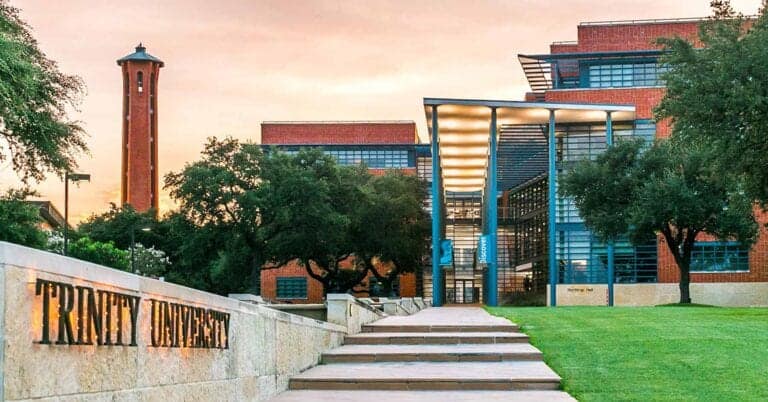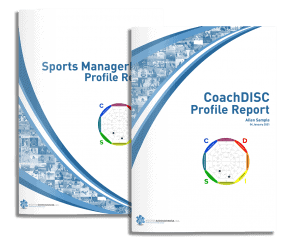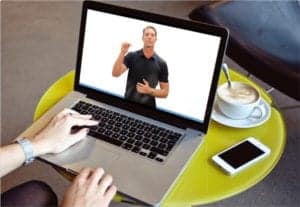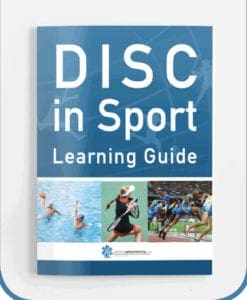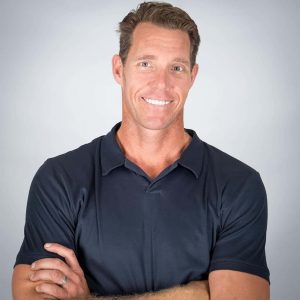Bryan Beigie, Practicum and Internship Coordinator, in the Exercise Science Sport Studies Department at John Carroll University, works with students on the cusp of their professional journey in the spectrum of health sciences.
It’s an exciting and testing time for students as they try their skills in the workplace. Bryan has an excellent rapport with his students and talks to us about the importance of creating engagement, where it comes from, and what’s behind the connection.
John Carroll University is located in Ohio and connected to Cleveland, the ‘City of Opportunities’, but it generates it’s unique character from the Jesuit Mission of the university’s staff, faculty and student cohort. For 130 years, John Carroll has provided a knowledge and character pathway for its students to become leaders who serve the greater good. Currently, the university’s student body consists of just over 3000 undergraduate and nearly 500 graduate students.
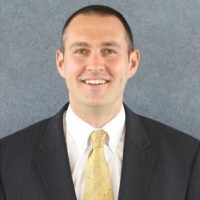
As the Practicum and Internship Coordinator (EPA/SPS 497 Internship and Seminar), Bryan works with students transitioning between academics and professional life. Bryan’s students go on to become Physical Therapists, Occupational Therapists, Athletic Trainers, Strength and Conditioning Coaches, Nutritionists, Nurses, Chiropractors, Sport Coaches, and Athletic Directors, as well as building careers on the business side of sport. Of this diverse student demographic Bryan says, “Truly, our department is a service industry gateway major.”
Considering this diversity, he says ,
“The single most important skill our students can take from our academic process into the professional industry is to recognize their job is to serve others.”
He explains what that service actually means and what it looks like in a workplace setting. Bryan explains that regardless of the specifics of their profession, students can serve others by “developing tremendous communication skills, being an active listener, learning their clients’ goals, and meeting those clients/patients/players, etc. where their shoes are.”
Bryan says, “At John Carroll University, our Exercise Science and Sport Studies Department is grounded in the Jesuit Tradition. A Jesuit education calls us to make the world a better place by being ‘men and women for and with others.’”
A little background research reveals that Bryan’s students are highly engaged in the classroom. In our experience, engagement must be in place before learning can occur, so we asked Bryan about creating that connection. He says,
“The best way to engage each student is to show a genuine interest in who they are, gain an understanding of what their professional goals are, and provide insight and advice about how they can tangibly achieve those goals. In Jesuit education there is a term called ‘Cura Personalis’…Care for the whole person, care for the individual. It is not my job to simply push content knowledge onto students’ plates for them to demonstrate an understanding of the information. Rather, it is my job to understand that each student is unique in the journey they wish to pursue. By treating every student as an individual, there is an opportunity to provide a meaningful education experience through content knowledge, application of acquired skills, as well as demonstrating the necessary dispositions to be successful in the career of their choice.”
Self-awareness and self-knowledge are a big part of Bryan’s program, so students uncover their natural disposition and behavioral tendencies by taking an Athlete Assessments’ DISC Profile as part of the course. Not only does this profile help Bryan get to know the students, it helps students understand themselves. This knowledge will help them create and improve their own connections, communicate and build relationships with future colleagues in the workplace, as well as their current fellow students, family and friends.
Bryan says, “Athlete Assessments offers our students the opportunity to learn about who they are, and who they might be in their profession using a unique tool that many undergraduates are unaware of. Often, we see students take personality and self-interest assessments to learn about the individual. Athlete Assessments however, provides behavioral analysis. Students can use this tool and workbook far past graduation as a tool for continuous reflection and growth.”
In his Internship and Seminar class, Bryan uses Athlete Assessments Academic Program and he explains that while the students benefit from the increased knowledge of themselves that the profiles bring, the guest lecture via video conference that is included in the program takes students to another level. Talking about the impact of this session, Bryan says, “The Zoom discussion provided another means of professional development. Also, Athlete Assessments helped reinforce the concept that our industry is about people, first and foremost. Quite seamlessly, Liz Masen and Bo Hanson (Liz, Athlete Assessments CEO and Bo, the company’s Senior Consultant and a 4x Olympian 3x Olympic medalist) were able to address students from as many as 10 different career aspirations. However, the information they provided and examples they gave demonstrated how each different career still shared the common thread of communication with different populations as key to achieve goals.”
For Bryan, teaching is all about the students, when we asked him what his favorite part of his role was he replied, “The students. John Carroll University is blessed to have some of the most talented, brightest, driven, highest character students in the country”.
And further,
“I get to work with all levels of students. I teach an Introductory Foundations course as well as a senior level capstone Internship course. I get to work personally with both exercise science and sport studies students. I get to deliver content knowledge, but I also get to discuss the exciting topics of career discernment and professional development. I get to provide guest speakers and tangible advice for our students through all the various professional networks I have been able to develop throughout the years.”
Drilling down into Bryan’s connection with his students, we asked him how his experience coaching high school and university level football and basketball influenced the approach he takes to his current role. Bryan says, “I am a big fan of the United States Service Academies Football Programs. I believe it is The Naval Academy that has a slogan, “INAM” – It’s Not About Me. In coaching, we are constantly striving to get young people to buy into this concept. We want young adults to realize the importance of setting individual goals second to those of the program, team, organization. I believe that creating that environment for myself, personally, in the classroom is critical in achieving course outcomes. For example, it does not matter that I have a passion for football and basketball. It would be easy for me to provide endless examples illustrating emotional intelligence through references to Coach K, Tony Dungy, and Brad Stevens. However, the courses I teach have students who love baseball and they want to hear about Terry Francona. There are aspiring nurses and therapists seated as well. They need to learn about a bed side manner story to better grasp the concept. Reaching ‘team/class goals’ while putting aside my personal passion is critical. Being a coach has helped me to focus on that skill.”
Bryan is as committed to his own development as he is to his students and explains one of his recent challenges. He says, “One of the biggest changes I have made in my teaching and administering experiential learning is that I have come to realize it is ok to make mistakes, and things do not have to go perfectly. In coaching, mistakes are unacceptable. A coach does not accept mistakes from players, and certainly a coach does not accept mistakes from themselves. However, sometimes a mistake can be a tremendous growth opportunity for a student. In the past, if I noticed a student was not acting or performing up to expectation, especially with professional behavior in the industry, I would step in and fix that situation because I did not want the appearance that I did not have my responsibilities under control. However, recently I have seen that by allowing the student to realize their error and accept personal responsibility for that error, an opportunity for lasting education was created. Often times that error led to greater growth than any guided success.”
Bryan reminds students that, “Upon graduation, you are looking for the next step, not the last step.”
And, putting it all into context, he says, “As an undergraduate student, I transferred to John Carroll University during an exceedingly difficult time in my personal life. The Priests, Faculty, and Staff at JCU during my time could not have laid a better foundation of what it means to be loving. (Without them), there is a zero percent chance I am the professional and person I am today. I consider everyday a blessing and a challenge to provide the same care and compassion that I was afforded.”
Bryan shared so much valuable information during our interview that we’ve included and extended Q&A click here
LOVE THIS ARTICLE?
DOWNLOAD YOUR FREE, PRINTABLE PDF COPY BY FILLING OUT THE FORM BELOW!
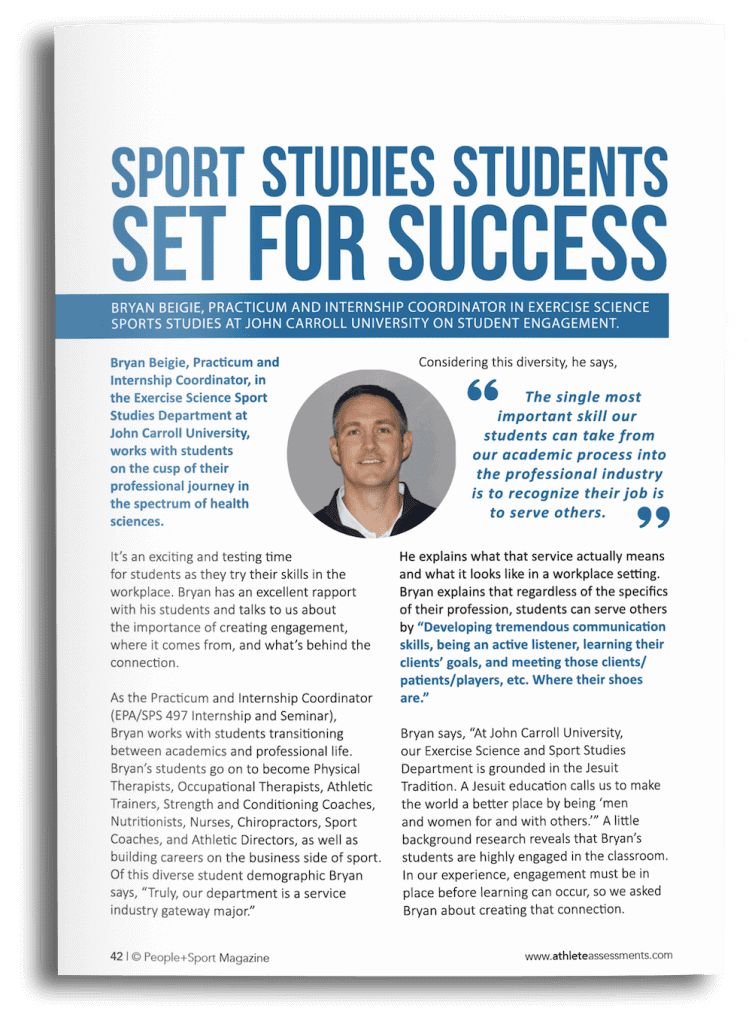
Where to from here?
Bryan Beigie, uses Athlete Assessments’ Sport ManagerDISC Profile as part of the Exercise Science/Sports Studies Internship and Seminar at John Carroll University.
Whether you teach Sport Management, Sport Coaching, Sport and Health Sciences or sport psychology, provide your students with the skills to differentiate them when they enter the competitive sports industry. The success of your students reflects the success of your University Academic Program and we want to help you achieve success on all fronts.
Find out everything you need to know. We will send you a full information pack and organize your trial at no cost to you. We will also review your syllabus and make recommendations on the best way to incorporate the program within your class.
Contact us to receive your own information pack and free trial now.
Recommended Articles
Coaching, teaching, innovation, a flipped classroom, students with a growth focus and all in the context of sport at a University that made the Forbes list of the top 100 universities in the USA.
Leadership is not a role it’s an attitude; a state of mind, a way of behaving that inspires people around you to follow, hold similar beliefs, live similar values and work towards common goals.
Writing ranked #1 in the world next to your name is a rare honor. Writing it 2 years in a row means that you understand how to get it right, you’re an innovator and you stay at the forefront of your field. Loughborough University, the #1 University in the World for Sports Related Subjects, gets teaching the business of sport right.


